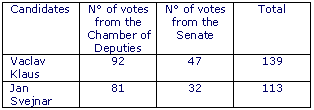News
Corinne Deloy,
Fondation Robert Schuman,
Helen Levy
-

Available versions :
EN

Corinne Deloy
Fondation Robert Schuman
Helen Levy
Czech Parliamentarians who met in the Spanish Hall of the Prague Castle, the official seat of the Presidency of the Republic, did not succeed in electing a new Head of State during the presidential election that took place on 8th and 9th February last. Neither of the candidates running – Vaclav Klaus, outgoing President, supported by the Civic Democratic Party (ODS) and Jan Svejnar, professor of Economy and Public Policy at the University of Michigan (USA), who is supported by the Association of Independents-European Democrats (SNK-ED) and the Open Democracy Club (KOD) led by Sona Paukertova – managed to win the absolute majority.
After the election and according to tradition the two candidates each made a speech. "My first 5 year term in office was a period of relatively satisfactory development typified by our country's accession to the European Union and by economic growth. If I am elected I shall try not to disappoint any of you during my second term in office since you represent 10 million citizens – and I shall also try not to disappoint any of our 10 million citizens," said Vaclav Klaus. "As the main theme of my Presidency I suggest "The Czech Republic without Borders". Let's try and achieve our projects together by placing emphasis on honesty, tolerance and mutual respect. The Czech Republic deserves to be successful, let's guarantee it that success by working together," declared Jan Svejnar.
The leaders of the parties represented in Parliament as well as some members representing both chambers then gave their opinion of the candidates. Jiri Paroubek, head of the Social Democrats and Martin Burski, head of the Greens criticised outgoing President Vaclav Klaus whilst Prime Minister Mirek Topolanek, leader of the Civic Democratic Party accused Jan Svejnar supporters of wanting to modify the election with a show of hands instead of the usual secret ballot.
Indeed the vote was delayed by several hours because of discussions on voting methods. The Greens and Social Democrats suggested there should be a show of hands, a suggestion the Civic Democratic Party were against but which was finally accepted by both Chambers of Parliament, although the Senate was not in favour 'a priori'. The presidential election therefore took place with a show of hands for the first time. The Czech Constitution does not specify the means of election to be used to appoint the President of the Republic. It simply indicates that the latter has to be elected by the members of Parliament, therefore by indirect suffrage. The atmosphere was particularly tense on 8th February, with the leaders of both camps criticising each other in front of the television cameras. Vaclav Klaus said that he believed the appeal for a show of hands was a strategy used to impede his re-election. The three rounds of voting were broadcast live on TV and followed by over 800,000 viewers.
Neither of the candidates won the absolute majority of the votes within each of the two Chambers (Chamber of Deputies and Senate), which is vital to be elected in the first two rounds of voting. During the first round outgoing President Vaclav Klaus won 47 of the 81 votes in the Senate and 92 of the 200 in the Chamber of Deputies; Jan Svejnar won 106 MPs votes and 32 from the Senators. In the second round the outgoing President won 94 votes from the Lower Chamber and 48 from the Senate, Jan Svejnar won 104 MPs' votes and 31 from the Senators. On 9th February the third round took place when the simple majority was sufficient to be elected.
Jan Svejnar won 113 votes whilst the present President won 139, i.e. one less than the necessary total to be elected. As announced before the election representatives of the Communist Party of Bohemia and Moravia (KSCM) abstained in the third round, withholding their votes for Jan Svejnar for whom they had voted in the first two rounds.
The two candidates immediately said that they would stand again on 15th February. "I have already taken part in four 3-round elections and I always win more votes than my competitors, I shall continue, it is possible," declared Vaclav Klaus after the first election. The Communist Party of Bohemia and Moravia announced that it would be putting forward a candidate in the next election. Several names have been mentioned including those of the former Foreign Minister, Jiri Dienstbier, the public ombudsman, Otakar Motejl and even the chairman of the science academy, Vaclav Paces.
The second presidential election will take place on 15th February next. Candidates have until 12th February to step forward.
Results of the Three Rounds in the Czech Presidential Election on 8th and 9th February 2008
1st Round

2nd Round

3rd round
 Source: Czech Press Agency CTK
Source: Czech Press Agency CTKOn the same theme
To go further
Elections in Europe
Corinne Deloy
—
15 April 2025
Elections in Europe
Corinne Deloy
—
25 February 2025
Elections in Europe
Corinne Deloy
—
18 February 2025
Elections in Europe
Corinne Deloy
—
28 January 2025

The Letter
Schuman
European news of the week
Unique in its genre, with its 200,000 subscribers and its editions in 6 languages (French, English, German, Spanish, Polish and Ukrainian), it has brought to you, for 15 years, a summary of European news, more needed now than ever
Versions :



